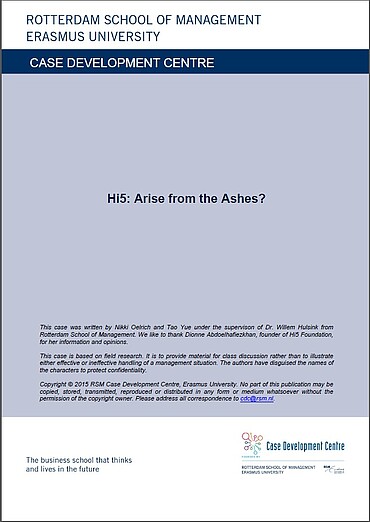description
The success of Hi5 – a Dutch foundation aiming to tackle social injustice – has thrown the work-life balance of its own employees out of sync. While employees consider quitting, Hi5 finds itself unable to continue using its brand name due to legal complications. Facing multiple complex problems, the founder has to decide whether to discontinue Hi5 or to make a fresh start.
Citation Note
Based on field research; 21 pages.
Follow the 'handle' link to access the Case Study on RePub.
For EUR staff members: the Teaching Note is available on request, you can contact us at rsm.nl/cdc/contact/
For external users: follow the link to purchase the Case Study and the Teaching Note.
Abstract
Stimulated by social injustice, the Dutch foundation Hi5 aimed to change the way businesses and young people think and act: Businesses have too many prejudices, which limit them from tapping into the talent pool, whereas youngsters play the victim too much, as they believe they cannot achieve great things due to their background, age or religion. In May 2013, five years after its founding, Hi5’s performance was beyond expectations and the brand name became well known. At the peak of its success, however, Hi5 could not continue using the brand name due to legal complications. The success also had an immense impact on the private lives of Hi5 employees who were all near 30 - their salaries were modest and the work-life balance was out of sync. The 26-year old founder, Dionne Abdoelhafiezkhan, needed to make an urgent decision whether to discontinue Hi5 or to make an entrepreneurial restart with a new brand name.
